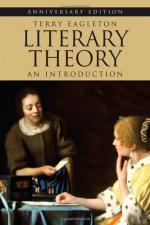
|
| Name: _________________________ | Period: ___________________ |
This test consists of 15 multiple choice questions and 5 short answer questions.
Multiple Choice Questions
1. What are Northrop Frye's three recurrent patterns of symbolism in literature?
(a) Analogical, demonic, tragic.
(b) Tragic, comic, romantic.
(c) Comic, apocalyptic, romantic.
(d) Apocalyptic, demonic, analogical.
2. What is the name of the Yale theorist who believed that all language is metaphorical?
(a) Michel Foucault.
(b) Julia Kristeva.
(c) Northrop Frye.
(d) Paul de Man.
3. According to Roland Barthes, what kind of sign draws attention to its own arbitrariness?
(a) An unproductive sign.
(b) An unhealthy sign.
(c) A healthy sign.
(d) A productive sign.
4. According to Eagleton, structuralism has proved that there is nothing _____ about codes.
(a) Guilty.
(b) Evaluative.
(c) Innocent.
(d) Progressive.
5. According to Eagleton, why does Northrop Frye emphasize the "utopian root of literature"?
(a) Because it is marked by a deep immersion in the actual social world.
(b) Because it is marked by a deep relation to the actual social world.
(c) Because it is marked by a deep sorrow for the actual social world.
(d) Because it is marked by a deep fear of the actual social world.
6. According to Eagleton, what term is "most-widely touted" in cultural theory?
(a) Postmodernism.
(b) Premodernity.
(c) Postmodernity.
(d) Modernism.
7. In psychoanalytic treatment, what happens during transference?
(a) The patient "transfers" on to the analyst feelings she or he experiences.
(b) The analyst "transfers" on to the patient the diagnosis.
(c) The patient "transfers" on to the analyst the conflicts she or he suffers from.
(d) The analyst "transfers" on to the patient the conflicts she or he suffers from.
8. How did post-structuralism respond to France's student movement's failed attempt to break state power?
(a) Post-structuralism sought to create a free language.
(b) Post-structuralism sought to create a more powerful language.
(c) Post-structuralism sought to break state power.
(d) Post-structuralism sought to break the structures of language.
9. In American deconstruction, why does literary criticism become an "ironic, uneasy business"?
(a) Because it lays bare the illusoriness of meaning.
(b) Because it lays bare the permanence of meaning.
(c) Because it lays bare the temporality of meaning.
(d) Because it lays bare the physicality of meaning.
10. According to Eagleton, what "staggering fact" could not be put right by a theoretical technique?
(a) That there was no time in history where half of the human race was not considered inferior.
(b) There was no time in history where half of the human race fought for equality.
(c) That there was no time in history where women were not considered superior.
(d) There was no time in history where women and men were antagonists.
11. For Roland Barthes, what kind of literature attempts to conceal the constructed nature of language?
(a) Post-structuralist.
(b) Fantasy.
(c) Realist.
(d) Feminist.
12. According to Sigmund Freud, what is the name of the complex whereby a child experiences an unconscious desire for sexual union with its same sex parent?
(a) The Oedipus complex.
(b) The Medusa complex.
(c) The Eros complex.
(d) The Pandora complex.
13. What literary movement, according to Eagleton, "brought structuralist and post-structuralist criticism to birth in the first place"?
(a) Modernism.
(b) Surrealism.
(c) Post-modernism.
(d) Romanticism.
14. Why is structuralism "anti-humanist," for Eagleton?
(a) Because it rejected the myth that meaning begins and ends with individual experience.
(b) Because it rejected the myth that individuality was humanist.
(c) Because it rejected the myth the individual experience begins and ends with structure.
(d) Because it rejected the myth that humanity was humane.
15. Who said "there is no cultural document that is not at the same time a record of barbarism"?
(a) Julia Kristeva.
(b) Michel Foucault.
(c) Walter Benjamin.
(d) Karl Marx.
Short Answer Questions
1. According to Eagleton, the women's movement is not just about women having equal status and power as men, it is what?
2. What year did France's student movement strike against the authoritarianism of the educational institutions and in solidarity with the working-class?
3. Eagleton writes that his book is less an introduction to literary theory than a what?
4. What are Northrop Frye's four narrative categories at the root of all literature?
5. According to Sigmund Freud, what is the process by which human beings cope with desires they cannot fulfill by directing them towards a more socially valued goal?
|
This section contains 698 words (approx. 3 pages at 300 words per page) |

|




